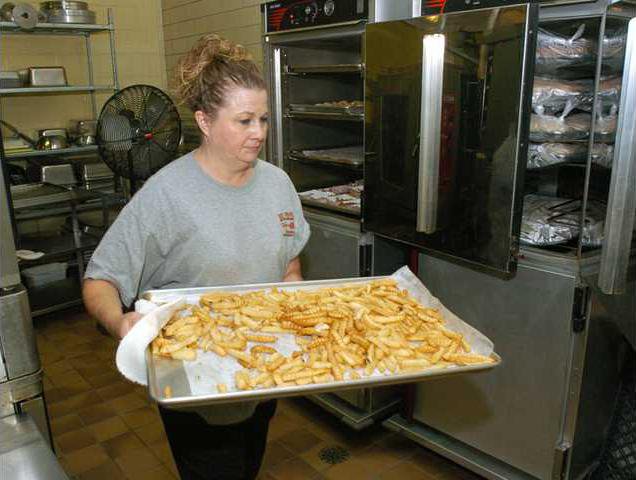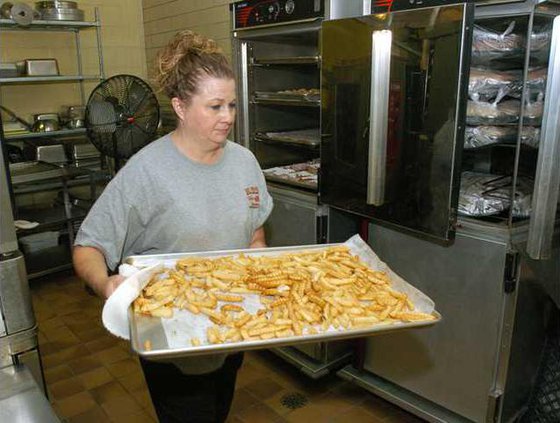Read other stories in this series:
Teachers endure lost class time with frustration, resolve
As furloughs hit schools around Gainesville and Hall County, little thought is given to the support staff who work in the schools — the cafeteria workers, custodians and bus drivers.
All play an essential role in running the daily lives of students, and they receive the same cuts as everyone else, regardless of salary.
“We discussed if our lower paid workers needed smaller decreases, but all of our staff are equally cut,” said Hall County Schools Superintendent Will Schofield. “We have a deeply held belief about the flattening of bureaucracy. We’re all team players, and there’s no equitable way to cut.”
The good news? The staff won’t be hit quite as hard as teachers. They work 180-day contracts and will only be cut for the missed school days, not the teacher planning days.
“Last year the furlough days only affected the staff in the form of a pay cut,” said Johnson High School Principal Damon Gibbs. “Now professional learning will be eliminated, as well as the early release days, and students will see four less instructional days.”
For the 2010-2011 school year, Hall County Schools announced eight furlough days, and Gainesville City Schools announced 10.
The days have been placed near traditional school holidays, and teacher planning time has dwindled.
“The big picture is we were told resources would go down 10 to 15 percent from the state,” Schofield said. “We looked in the payroll 18 months ago with understanding and started reading the tea leaves.”
The school board took a 10 percent cut, and Schofield took a cut 1 percentage point higher than the teachers.
“I think it made a strong statement to show staff support with the teachers,” he said. “We’re all doing more work with less money.”
The other circle of support that is forgotten during furlough talks? The future educators.
Although all business sectors are being hit by the economic downturn, hiring freezes and cuts from all sides are making education majors doubt their chosen careers.
“Some are starting to reconsider their commitment to education,” said Arthur Horne, dean of the University of Georgia’s School of Education. “I received an e-mail from a father of two grads who said both daughters have decided to leave education and that it’s not worth the hassle and stress.”
However, the majority of students are sticking with their coursework.
“Most aren’t in this for the money to start with and are here for the satisfaction of teaching,” he said. “A number of them are concerned about the freedom of creativity in their teaching and how the times are having an impact on fixed curriculum, but faculty are showing them how to do things creatively and innovatively.”
As they wait out the hiring freezes, some students are joining family businesses, looking to teach in private schools or charter schools and attending graduate school to continue their education before entering the field.
“I feel bad for someone who always wanted to teach, and now there’s nothing out there,” Schofield said. “Don’t become disheartened if you’re passionate. People who love children will follow their dreams. There will always be a place, but you may have to start with what you can get.”
With an aging demographic of teachers, a large percent of retirees will leave the field in five to 10 years, Schofield predicts.
“Some are holding on with the economic times, but when it gets better, a larger number of retirees will leave,” he said. “I think we’re setting ourselves up for another teacher shortage.”
Gainesville City Schools Superintendent Merrianne Dyer said she also hopes students will push ahead with their studies.
“It breaks your heart that there aren’t a lot of employment opportunities right now,” she said. “But I hope they’ll take a temporary job for now and come back.”
Dyer has considered contacting Department of Labor officials to suggest a radical idea — put unemployed teachers back in the schools and pay them using state unemployment funds.
“Districts are paying our portion of unemployment, and that could be used to pay salary,” she said. “There’s an opportunity there to keep people employed, help them stay experienced, maintain enthusiasm and make some income.”
Although the idea would take a large amount of cooperation and work, Dyer said innovative ideas must happen in tough times.
“I know we’re in a territory where we must think up brand new ideas,” she said. “Otherwise, unemployed workers are just consumers of tax dollars rather than producers. Some of these teachers in Cobb and Fulton County have worked their whole lives in teaching and want to keep producing.”

